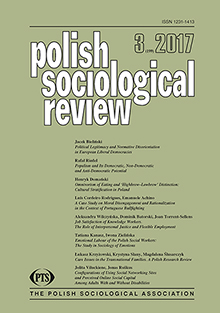Job Satisfaction of Knowledge Workers. The Role of Interpersonal Justice and Flexible Employment
Job Satisfaction of Knowledge Workers. The Role of Interpersonal Justice and Flexible Employment
Author(s): Dominik Batorski, Aleksandra Wilczyńska, Joan Torrent-SellensSubject(s): Sociology of Culture, Economic development, Socio-Economic Research
Published by: Polskie Towarzystwo Socjologiczne
Keywords: interpersonal justice; knowledge workers; empliyment flexibility; job satisfaction
Summary/Abstract: Organizational justice is a crucial aspect of good management. It has been shown numerous times that an unjust work environment has an adverse impact on employees in terms of job satisfaction. Yet is this effect homogeneous in all groups of workers? In this paper we strive to provide an explanation for this question, presenting a study concerning the impact of one of the dimensions of organizational injustice-interpersonal injustice, on the job satisfaction of knowledge workers in Poland. In particular, we demonstrate how perceived injustice at work influences their job satisfaction compared with other workers. We also analyse whether flexible employment has a mitigating effect on this relationship. Logistic regressions estimated using sample of 23,942 workers surveyed between 2009 and 2013 showed that in both groups interpersonal injustice significantly diminishes job satisfaction. However, in the case of knowledge workers, this effect is significantly smaller among employees with temporary contracts. The mitigating effect of temporary employment is not present among other workers. The results suggest that permanent knowledge workers, are more vulnerable to interpersonal injustice.
Journal: Polish Sociological Review
- Issue Year: 199/2017
- Issue No: 3
- Page Range: 329-350
- Page Count: 22
- Language: English

